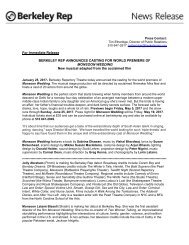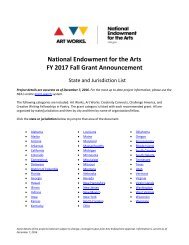BERKELEY
program-ic
program-ic
Create successful ePaper yourself
Turn your PDF publications into a flip-book with our unique Google optimized e-Paper software.
Below The first edition of the novel It Can’t Happen Here<br />
THE ORIGIN STORY<br />
We’re beginning a new feature in our<br />
programs this season which aims to shed some light<br />
on how our shows find their way to Berkeley Rep.<br />
Every production has a unique path to our stage, and<br />
we thought it might be interesting to share a little bit<br />
about how they got here.<br />
Through a series of circumstances, we found<br />
ourselves very late in the season planning process<br />
without a season opener. This presented a fantastic<br />
opportunity to work in a different way—i.e., fast and<br />
furious. Normally new plays live in the pipeline for<br />
years, taking their time to develop and evolve at their<br />
own pace.<br />
The artistic staff<br />
pitched idea after idea<br />
and titles ricocheted<br />
among us at a frantic<br />
pace. Michael Leibert<br />
Artistic Director Tony<br />
Taccone says, “[Associate<br />
Director] Lisa<br />
Peterson sent me an<br />
extremely long text<br />
with about 30 titles on<br />
it all dealing with some<br />
aspect of American<br />
politics because the<br />
election was looming. It<br />
Can’t Happen Here stuck to the wall like spaghetti and<br />
we kept coming back to it.”<br />
Then we found out there was already an existing<br />
stage adaptation and the stars seemed to be aligning.<br />
Lisa, on a whim, had googled the phrase “it can’t<br />
happen here” because it had been resonating in her<br />
mind, but she says, “I had no idea about the novel or<br />
the Federal Theatre Project history. I was amazed—<br />
there’s this Sinclair Lewis novel, there’s this history of<br />
it being a theatrical event, my God!”<br />
It soon became clear that the 1930s adaptation<br />
was in desperate need of updating, rendering it unusable<br />
for our purposes. A new adaptation was needed.<br />
You can read more about the development process in<br />
the interview with Lisa, Tony, and co-writer Bennett<br />
Cohen, but suffice it to say the chance to respond<br />
swiftly to the current political climate we find ourselves<br />
in proved irresistible, and the rest, as they say,<br />
is history.<br />
OUTSTRIPPED<br />
AN INTERVIEW WITH TONY<br />
In July, Berkeley Rep’s Ground Floor held a<br />
workshop of It Can’t Happen Here to revise the script and stage<br />
sections of the play. Literary Manager Sarah Rose Leonard<br />
grabbed Director Lisa Peterson, Michael Leibert Artistic<br />
Director and Playwright Tony Taccone, and Co-writer Bennett<br />
Cohen before a packed rehearsal day to discuss what it’s like<br />
to adapt a novel into a play at breakneck speed and why this<br />
particular story feels so urgent.<br />
Sarah Rose Leonard: It Can’t Happen Here was adapted<br />
into a play in 1936. Will you talk about why we aren’t<br />
producing that adaptation and instead decided to create a<br />
new one?<br />
Tony Taccone: I was so excited to read the play. I love the<br />
Federal Theatre Project. My dissertation was about it. So I<br />
was like, “Yeah, we get to do a wpa [Work Projects Administration]<br />
play!” But then I read it, and by the third scene, I<br />
was like oh, this is not good. First of all, it’s nothing like the<br />
book—it’s so melodramatic. It became clear, this is the reason<br />
nobody’s remounted this. It has fallen into the dustbin of<br />
history for a reason.<br />
16 · THE <strong>BERKELEY</strong> REP MAGAZINE · 2016–17 · ISSUE 1




